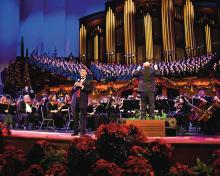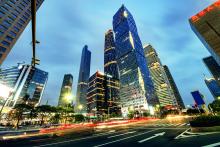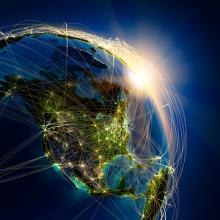Globalization

BY THE TIME you read this, all of the important appointments in the new Trump administration will have been made, and the shape of the disaster that awaits us will be clear. Maybe the new president never did, as New Yorker satirist Andy Borowitz suggested, appoint cartel kingpin Joaquin “El Chapo” Guzman as head of the Drug Enforcement Administration. But with the appointment of fast-food mogul Andrew Puzder as secretary of labor, vulture capitalist Wilbur Ross as secretary of commerce, and Wall Street vampire Steven Mnuchin as secretary of treasury, Trump certainly spit in the face of the low-income white voters who put him over the top in the industrial Midwest.
Which brings us back to the recurring question: Why did so many blue-collar white people vote for a greedy, self-dealing billionaire in the first place? One answer is that Trump very effectively pushed the buttons of racial resentment (mostly about immigrants and Muslims) that are especially sensitive in less-educated, white areas. There is certainly something to that theory. But it doesn’t account for the fact that, as New York Times polling whiz Nate Cohn has noted, “Clinton suffered her biggest losses in the places where Obama was strongest among white voters.”
I would argue instead that Trump won primarily because he finally named the shadow that has hung, unacknowledged, over American life for at least the past 25 years: globalism. On June 28, 2016, during one of candidate Trump’s rare attempts to stay on message and give a serious public policy statement, he said, “Today, we import nearly $800 billion more in goods than we export. This is not some natural disaster. ... It is the consequence of a leadership class that worships globalism over Americanism.”

Another reason for a lack of diversity in church leadership is that Mormonism’s growth outside the white communities of the United States and Europe was for a long time sporadic. Until 1978, the church did not allow black members to hold priesthood or worship in temples, rites required for priestly leadership in the church.

In the midst of a raging discussion about what it means to be American, it is worthwhile to reflect on the profound ambivalence of American civil religion — perhaps the most powerful force for creating a shared national identity.
In 1967, Robert N. Bellah’s seminal essay, “Civil Religion in America,” created a template for how both the right and the left defined civil religion to cultivate a sense of belonging, particularly in an era of turbulence. During this period of increasing polarization, Bellah’s words are more relevant than ever.

China is experiencing “one of the great religious revivals of our time,” Johnson writes. “Across China, hundreds of temples, mosques, and churches open each year, attracting millions of new worshippers. … Faith and values are returning to the center of a national discussion over how to organize Chinese life.
“This is not,” he continues, “the China we used to know.”

A Vatican envoy urged the World Trade Organization to keep promises made to the poor, amid concerns that its tariff-cutting efforts are disproportionately benefiting rich countries. The appeal came as the WTO, a Geneva-based organization that regulates international trade, was holding a four-day meeting ending Dec. 18 in the Kenyan capital.
REBECCA TODD PETERS offers here a concise treatment of the major moral concern of a large part of Christian social ethics: the structures of globalized economic life and their manifest injustices and unsustainability. She also offers a moral framework to guide the thinking of unjustly, and often blindly, privileged First World Christians about the moral situation in which we find ourselves.
She proposes concrete action guides for how such First World Christians can gradually and intentionally empty ourselves of these privileges in order to stand in solidarity with those whose lives are harmed in the delivery of our advantages. In the end what emerges is a kind of liberation ethics for those who didn’t know they needed to be liberated—in this case, from their own advantages.
IT WAS AN average afternoon in the college town of Northampton, Mass. I was sitting at a local coffee shop sipping a latte when I overheard the conversation between two students comparing laptop decals.
“I’m really into the whole child soldier thing. This sticker is about that,” explained one young woman. The other pointed to an emblem on her laptop, remarking, “I’m more interested in the issue of sex trafficking, but I guess everyone is.”
“Yeah,” the other girl responded, “It’s kind of the sexy social justice issue.”
An intense interest in social justice has been a hallmark of the Millennial generation thus far. Within the church, there has been a clear departure from the traditional emphasis on evangelism alone to a broadening conversation about the necessity of addressing physical needs and human rights. Millennials have made great strides in engaging some of the world’s most pressing issues, but is the popularity of social justice a completely good phenomenon?
The Good
As a result of globalization, my generation is more aware than ever about the plight of those Jesus refers to as our “neighbors.” This awareness has heightened funding for NGOs, mobilized willing volunteers, and built pressure for better public policy. We have more knowledge regarding the injustices that people face all across the globe, and we’re often not content to simply cross to the other side of the road. It’s trendy to know and talk about justice issues, and this popularity has often led to action.
ONE OF THE most well-known and revered icons today is Andrei Rublev’s reflection on the Holy Trinity, painted between 1422 and 1425 in Russia. It depicts three angels seated around a table that bears a chalice. The female figures form a circle evoking deep mutuality, interconnectedness, and love between one another. But the circle is open, inviting the world into this profound experience of community. As Christine Challiot, an Eastern Orthodox laywoman, wrote, “Rublev painted the three angels with a circular motion to signify their unity and equality, ‘thus creating a unity to represent the Holy Trinity in its movement of love.’”
This profound reflection is set in the biblical context of giving hospitality to the stranger. The icon depicts the story of the hospitality offered by Abraham and Sarah in Genesis 18:1-15 to three strangers. Abraham rushed to offer them hospitality—water and food.
The three migrating strangers are messengers of God. The text says simply that they were the Lord; interpreters see the three as the presence of the Trinity. And they, in turn, bring an announcement that Sarah, in her old age, will bear a son, fulfilling God’s promises. Sarah and Abraham suddenly find the tables reversed, and they are the guests at God’s table, being invited into this community of love. Thus, Catholic theologian Elizabeth Johnson explains, “This is a depiction of a trinitarian God capable of immense hospitality who calls the world to join the feast.”
This biblical story is a declaration of the unexpected, life-giving presence of God, discovered through providing hospitality to strangers. Rabbi Jonathan Sacks notes that the love of strangers is declared 36 times in the Hebrew scriptures, as opposed to the love of neighbor, mentioned only once. The love of strangers and sojourners is a primary test of one’s love for God; this is linked to the presence of migrating people, with whom we can unexpectedly encounter God in fresh and promising ways that open the future to new possibilities.

Before we had kids, we loved to travel, had worldview stretching experiences, and were all together creative in how we lived the lives we had been given. For us, having the right kind of experiences meant far more than have the right kind of house, car or, other possession that could be associated with “success.” As we reflect on our development individually and as a couple in the context of marriage, it is clear that these experiences (and resulting relationships) have shaped us more significantly than any classroom or lecture series. It has been the classroom of real life relationships that have formed us into global citizens who follow a Jesus with a global reign.
And then we had kids …

WHEN POPE BENEDICT XVI unexpectedly announced his resignation in mid-February, many expressed admiration for the decision's honesty and humility, and much speculation followed about the reasons for it—and the consequences it would have.
As transition takes shape in the Vatican, Catholics around the world are commemorating the 50th anniversary of the Second Vatican Council, which took place from 1962 to 1965 and which redefined the church's relationship to the world. Vatican II's final document said: "This council can provide no more eloquent proof of its solidarity with, as well as its respect and love for the entire human family with which it is bound up, than by engaging with it in conversation about these various problems," referring in part to the "profound and rapid changes ... spreading by degrees around the whole world." Half a century ago, few could have predicted the dramatic changes that were to follow in science, technology, global integration, and social mores.
Catholics know that in the last 50 years the institutional church has been at the forefront of calls for a more just, compassionate, and sustainable world. Catholic social and ecological teaching is well developed and clearly articulated. The church has offered analysis and challenging proposals for financial reform, arms control, care for creation, and multilateral political structures of accountability in response to globalization.
We want the new pope to continue, deepen, and make much more visible—including to Catholics around the world—the church's prophetic work for social and economic justice, for environmental sustainability, and for wise, just, and inclusive peace. We want the new pope to engage the Islamic world, respectfully cooperating in response to orchestrated fear, enemy-making, and all forms of religious extremism. We want him to promote cultures of peace in a world that is increasingly violent. We want him to be open to new cosmological insights that are transforming human consciousness; shifting our understanding of earth community and of our planet's place in the vast, expanding universe; and maturing our reflections on the One who is Creator, Incarnation, and Spirit of love.

I believe that most people are good, decent folks who want to see their community thrive and be healthy. The can of worms with the globalized economic system we live with, however, is twofold. Firstly, it is pathologically designed to function towards injustice, and injustice implicates the exploitation, destitution, and ultimate collapse of local communities around the world, especially in the poorer countries. Secondly, this global economic system does all that it can to make “community” invisible. The vast majority of those coffee drinkers who stop by the local supermarket or coffee shop to buy a pound of coffee have no idea where there coffee came from, who picked it and under what consequences.
Thus, when one is confronted with the inevitability of making a “global” economic choice, my advice would be to take the time to think about what one would want for his or her own community, and then to question how that far-off, distant community across the world where this or that product is being produced is going to be affected. This is not going to be easy for it requires the determination to discover what is purposely being hidden by the designs of the global economic system. But that is perhaps the price we should be paying to be able to enjoy a hot cup of coffee grown thousands of miles away.
THE DOCUMENTARY film The Economics of Happiness, produced by the International Society for Ecology and Culture, begins starkly, with full-screen titles that tell us we are facing an environmental crisis, an economic crisis, and a crisis of the human spirit. As the film goes along, it strongly suggests that those three crises are interrelated.
In the end, the filmmakers and their multicultural array of talking heads ask that we stop measuring human progress simply by economic growth and give priority to the quality of life, the health of communities and their cultures, and the sustainability of our economic practices. In short, they suggest replacing our mad rush toward globalization with a back-to-the-future move to “localization.”
Early in the film, writer-director-narrator Helena Norberg-Hodge tells us about the people of the remote Ladakh region of the Himalayas, one of the highest spots on earth to be inhabited by a settled human community. When Norberg-Hodge first visited the Ladakhis in the 1970s, she says, they were self-sufficient, healthy, and mostly at peace, with themselves and each other. Then came the great Western world with its bells and whistles and manufactured needs. Soon the people became dissatisfied with their traditional way of life and were driven to compete in a cash economy. Before long, there was open hostility between Muslims and Buddhists, who had co-existed peacefully for centuries, a fraying of the social fabric, and an atmosphere of gloom and depression.

We are connected with people and places through ways and means unlike any previous generation. We live in a “global village."
We are connected through worldwide round-the-clock television networks, rapid international travel, mobile phones, Skype, and wonders of the Internet. But while such connections are indeed profound, the bonds of our global village run far deeper, for we are also linked through global events and international endeavors. Whether it is sporting events like the Olympics, a royal wedding, or various natural disasters that capture worldwide attention and compassion, the reach and depth of our global village passes through time zones and crosses national boundaries.
While these characteristics of the global village are astounding, our connections run even deeper as a result of the global process of production, distribution, consumption, and waste. In other words, the architects of our global economy intentionally linked local communities with others that are thousands of miles away. And so, while these massive multinational connections are often unnoticed in daily North American life, once we take a deeper look, we recognize that they are not only evident, but are also far from impartial.

It often seems that just as we begin to get our heads around how we might understand our world, everything changes. There have been tipping points at various moments in history; events or advances which move us from one epoch to another in such a way that we can never see the world with the same eyes again. It happened during the Industrial Revolution; it happened with the Communications Revolution; and it happened on September 11, 2001.
And according to Ayesha and Parag Khanna, we are approaching (or indeed, have already reached) another of these defining moments—what they call “The Hybrid Age.” In their book, Hybrid Reality: Thriving in the Emerging Human-Technology Civilization, published as part of the TED Books series, they examine how we have reached this moment, and what that means for our futures, and for generations beyond our own.
Hybrid Reality, in a similar fashion to many of the e-books that have developed out of the popular series of talks, reads like a manifesto – and in this case, it is a manifesto for navigating the unknown, exciting, and at times, downright terrifying potential futures which we are opening ourselves up to as technology becomes more and more sophisticated and more and more a part of us.
IT’S EASY to make the assumption that obesity is an individual problem, having more to do with personal health than with social justice. After all, people make their own decisions about what they put on their plates and how much they put in their mouths.
But many people—and many churches—are starting to see not only the public health consequences of the obesity epidemic, but also the broader forces that contribute to it.
And “epidemic” isn’t too strong a word for the growing problem of obesity. The numbers in the U.S. are unsettling, with startling increases over the past few decades. But the worst may be yet to come, as billions of people in formerly developing countries are gradually globalized into “fast-food nation” lifestyles.
The transition has already begun. According to a recent U.N. report, more than 1 billion people around the world are overweight. Each year excess weight and obesity cause 2.8 million deaths—65 percent of the world’s population now lives in countries where being overweight kills more people than being underweight. And it’s only going to get worse: According to Olivier De Schutter, the U.N. special rapporteur on the right to food, by 2030 as many as 5.1 million people in poor countries will die each year before the age of 60 from unhealthy diets and diet-related diseases such as diabetes, 1.3 million more than today.
The definitions of hunger and malnutrition are changing, and as a result so are the responses—but perhaps not quickly enough.
If we look at what is happening this week – elections in Egypt and the Democratic Republic of Congo, an aid effectiveness conference in South Korea, the continuing Arab Spring in Syria and beyond, World Aids Day Thursday – and in the coming weeks -- the U.N. climate change conference, COP17 -- we cannot pretend that these events have no impact on our lives here and now.
Every one of these events is a matter of justice. The citizens of Egypt and the Democratic Republic of Congo deserve the opportunity to express freely, without fear of intimidation or violence, how they believe their country should be governed. Having spent some time in the region, I believe that the people of the DRC deserve more than any other to live in a country where they are safe and secure.
How we assist other countries in their development is an issue of justice.
I just returned from a very moving convocation at the Claremont School of Theology where I am on the faculty. We were celebrating the historic founding of a new interreligious theological university that brings together institutions representing the three Abrahamic faiths, along with our newest partner, the Jains. The Jains are an eastern religion founded in India over 2,500 years ago who are perhaps best known for their deep commitment to the concept of no-harm or ahimsa.
While each partner institution will continue to train religious leaders in their own traditions, the Claremont Lincoln University will be a space where future religious leaders and scholars can learn from each other and collaboratively seek solutions to major global issues that no one single religion can solve alone. The CLU's founding vision of desegregating religion was reflected in the extraordinary religious diversity present at the convocation held in a standing room-only auditorium. I sat next to a Jewish cantor and a Muslim woman who had tears flowing down her face as we listened to the prayers offered in all four religions along with a reflection from a Humanist speaker.
After having spoken at the Greenbelt Festival in England a number of times now, we at the Center for Action and Contemplation always hoped and planned that we create a similar festival for spirituality and the arts in the United States. We had nothing comparable, and it was a niche waiting and needing to be filled. Therefore, we were honored to be a part of the first Wild Goose Festival in North Carolina last June, and hope that we can convene a truly ecumenical, radical, and socially engaged crowd of people living at the intersection of justice, spirituality, and creativity -- and those who want to be!
At the end of Roland Joffé's exquisite film, The Mission, a brief exchange between a Portuguese ambassador and a papal emissary sums up the tension between globalization (the movie's subject matter) and a worldvi